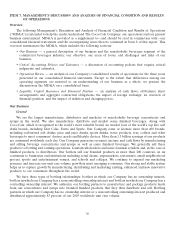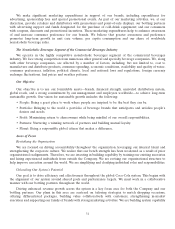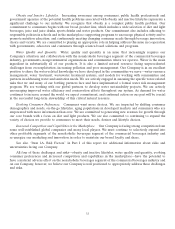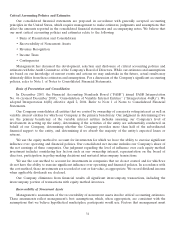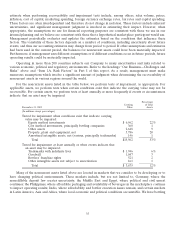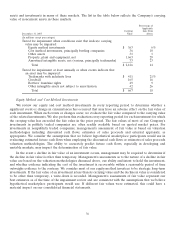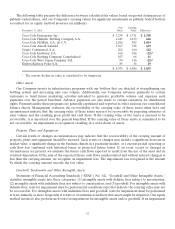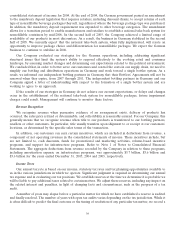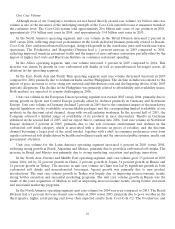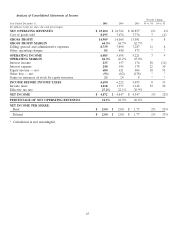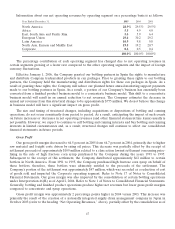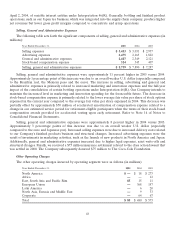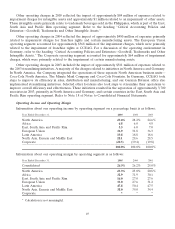Coca Cola 2005 Annual Report Download - page 41
Download and view the complete annual report
Please find page 41 of the 2005 Coca Cola annual report below. You can navigate through the pages in the report by either clicking on the pages listed below, or by using the keyword search tool below to find specific information within the annual report.consolidated statement of income for 2004. At the end of 2004, the German government passed an amendment
to the mandatory deposit legislation that requires retailers, including discount chains, to accept returns of each
type of nonrefillable beverage packages they sell, regardless of where the beverage package type was purchased.
In addition, the mandatory deposit requirement was expanded to other beverage categories. The amendment
allows for a transition period to enable manufacturers and retailers to establish a national take-back system for
nonrefillable containers by mid-2006. In the second half of 2005, the Company achieved a limited range of
availability of our products in most discounters. As a result, the business in Germany stabilized in the second
half of 2005. We currently expect that the national take-back system, when fully implemented, will create an
opportunity to improve package choice and differentiation for nonrefillable packages. We expect the German
business to continue to stabilize in 2006.
Our Company evaluated our strategies for the German operations, including addressing significant
structural issues that limit the system’s ability to respond effectively to the evolving retail and consumer
landscape, by assessing market changes and determining our expectations related to the political environment.
We concluded that, in order to better serve our customers and control the costs in our supply chain, we need to
simplify our bottling and distribution operations in Germany and work toward a single bottler system. As a
result, we informed our independent bottling partners in Germany that their Bottlers’ Agreements will not be
renewed when they expire, from 2007 through 2011. The independent bottling partners in Germany and our
Company signed a letter of understanding with respect to the formation of a single bottler system and are
working to agree to an approach.
If the results of our strategies in Germany do not achieve our current expectations, or delays and changes
occur in the establishment of the national take-back system for nonrefillable packages, future impairment
charges could result. Management will continue to monitor these factors.
Revenue Recognition
We recognize revenue when persuasive evidence of an arrangement exists, delivery of products has
occurred, the sales price is fixed or determinable, and collectibility is reasonably assured. For our Company, this
generally means that we recognize revenue when title to our products is transferred to our bottling partners,
resellers or other customers. In particular, title usually transfers upon shipment to or receipt at our customers’
locations, as determined by the specific sales terms of the transaction.
In addition, our customers can earn certain incentives, which are included in deductions from revenue, a
component of net operating revenues in the consolidated statements of income. These incentives include, but
are not limited to, cash discounts, funds for promotional and marketing activities, volume-based incentive
programs, and support for infrastructure programs. Refer to Note 1 of Notes to Consolidated Financial
Statements. The aggregate deductions from revenue recorded by the Company in relation to these programs,
including amortization expense on infrastructure programs, was approximately $3.7 billion, $3.6 billion and
$3.6 billion for the years ended December 31, 2005, 2004 and 2003, respectively.
Income Taxes
Our annual tax rate is based on our income, statutory tax rates and tax planning opportunities available to
us in the various jurisdictions in which we operate. Significant judgment is required in determining our annual
tax expense and in evaluating our tax positions. We establish reserves at the time we determine it is probable we
will be liable to pay additional taxes related to certain matters. We adjust these reserves, including any impact on
the related interest and penalties, in light of changing facts and circumstances, such as the progress of a tax
audit.
A number of years may elapse before a particular matter for which we have established a reserve is audited
and finally resolved. The number of years with open tax audits varies depending on the tax jurisdiction. While it
is often difficult to predict the final outcome or the timing of resolution of any particular tax matter, we record a
39



